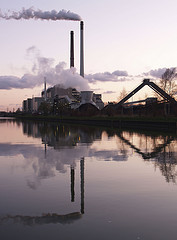According to a new national survey (pdf) for the Sierra Club conducted by Greenberg Quinlan Rosner some good news: American voters overwhelmingly want to see the country move away from coal and toward renewable energy; they believe the government should be taking more action to combat climate disruption; and there’s strong support for new Environmental Protection Agency limits on carbon pollution from power plants, support which holds up after voters hear pros and cons about the proposal, including strong arguments from opponents of the plan on its potential impact on jobs and energy prices.
Voters reject the idea that limits on carbon pollution will harm the economy. And, notably, it’s some of the most important and growing parts of the electorate, millennials, Latino voters, African Americans, and “moderates,” who are ahead of the curve when it comes to attitudes about the EPA and the need for government solutions on climate change.
You can read the press release for all the findings.
Digging a little deeper, here are a couple things I found particularly interesting:
- People believe the evidence that climate change is happening. When asked about the best evidence that climate disruption is happening, 73 percent cite evidence they’ve seen or heard, with the most referring to melting glaciers and polar ice caps and rising oceans. Also convincing are extreme weather, shorter winters and hotter summers. Only two percent cite evidence from scientists and academics.
- The Environmental Protection Agency (EPA) gets very solid favorability ratings. Forty-four percent of voters give the EPA a warm, favorable rating compared to only 27 percent who give the agency a cool, unfavorable rating. (To put it in perspective, the Clean Air Act gets 49 percent favorable, 18 percent unfavorable. Americans are split when it comes to coal companies: 30 percent favorable, 26 unfavorable. Compare that to tobacco companies: 9 percent favorable, 69 percent unfavorable). The highest levels of favorability are found among moderates and millennials.
- Voters believe, incorrectly, that the federal government already regulates carbon pollution. A majority of voters (56 percent) incorrectly believes that the government currently regulates carbon pollution, while just 28 percent correctly understands that there are currently no regulations on the amount of carbon pollution power plants can release.
- Voters overwhelmingly want to see the country move away from coal and toward renewable energy. A strong majority (61 to 33) believes that as a country we should be investing more in energy efficiency and renewable energy sources like wind and solar vs. investments in traditional energy sources like coal, oil, and gas.
- In fact a strong majority wants to move entirely away from dirty fossil fuels by 2030, including 58 percent of American voters overall, 57 percent of moderates, 78 percent of Hispanic voters, and 77 percent of millennials.
- American voters are ambivalent about coal companies. However they feel about dirty fossil fuels, coal companies fare alright. Unlike tobacco companies which receive only “warm” favorability from 9 percent and “cool” from 69 percent, Americans are split when it comes to coal, with 30 percent feeling warm and 26 percent feeling cool.
- The most compelling messages in support of carbon pollution limits focus on health, pollution, and extreme weather. Voters in the greatest numbers found arguments “very” or “somewhat convincing”—with the highest levels of intensity—when they touched on public health issues related to coal-fired power plants that threaten families, including asthma, heart disease, cancer, and respiratory ailments. Also compelling were messages about how the threat, left unchecked, could mean pollution levels here at home like those in China. Another compelling message was about increasingly severe and dangerous climate impacts like heatwaves, wildfires, and storms, and our obligation to our children to leave them a planet that’s not damaged and polluted. All of the top messages emphasized doctors, nurses, and/or scientists as expert messengers.
- Also compelling but with slightly less intensity: Messages about polluters dumping in our atmosphere for free; a simple update of the Clean Air Act; opportunities for economic benefits, innovation, and jobs with a clean energy economy; going “all in” on clean energy and no longer relying on the dirty fossil fuels of the past; keeping up with the rest of the world when it comes to clean energy opportunities; more choices and lower energy costs in the long run.
- None of the opposition messages were as compelling to voters as the top messages in support of carbon limits. The standard arguments did the best—higher prices for everything we buy, disruptions in service, competitive disadvantages for American businesses, comparisons to China and India—but intensity as well as the total of “somewhat” and “very” convincing responses to these arguments was consistently lower than the arguments in favor of EPA limits.










Michael Foster
Hi Anne!
“The most compelling messages in support of carbon pollution limits focus on health, pollution, and extreme weather.”
Mike McGinn suggested you might help me find effective language for a campaign. Can we talk? about how to promote the “No New Carbon Pollution” Pledge, a kind of ‘No New Taxes’ litmus test for legislators on climate.
I’d like to peg every legislator and candidate for office on the record, “Will you pledge to oppose any bill or rule that would increase carbon pollution?”
It’s not a solution; but if we get officials to understand that the majority of voters think we’re polluting fast enough already thank-you-very-much, then they can sign on knowing they have majority backing. If they don’t sign, we can label them pro-pollution. With this pledge in place,effectively capping new expansion efforts, blocking new infrastructure, prohibiting new extraction, we can start to talk about real limits and reductions, and just maybe stop playing Whack-A-Mole.
I work with the Plant-For-The-Planet kids as a volunteer, and offer a climate talk, ‘Al Gore’ style, for all ages.
Anna Fahey
You can contact me via email: anna (@) sightline . org.
Anna